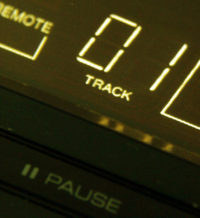I’ve thought a lot about the art of listening over the years, and for this podcast, I wanted to lay down a guide of some sort. But, making a guide for listening? Do we even need such a thing? We can hear the music – isn’t that enough? Is hearing different from listening? Is the old argument, “I know what I like” a valid one?
Allow me to start this by recounting a personal story – one that’s had a huge influence on the way I listen today. I realize that we will all have our own story and our own way of looking at the world, but bear with me on this. Some years ago, while attending a new music conference, I had an epiphany – a big one. It changed how I hear music. But before I get to that, let me back up and ask a question to all you composers out there. Why do we compose? There’s tons of music out there already – tons of great, earth-shattering, mind-blowing, consciousness-altering, transcendent music out there already. Why bother?
I think, as composers, we’re just not hearing quite what we want to. We have ideas. We have philosophies. We have certain things that we are desperate to hear – so desperate in fact, that we will subject ourselves to weeks, months – hell, even years of self-doubting, solitary, exhausting work to create even the hope of hearing those sounds. I’m no different – there are things I want to hear – I put them into my music – I think you do, too.
So, back to the new music conference. Here I was, sitting through concert after concert of new works – finding that I was not enjoying most of what I was hearing. Finding myself either rolling my eyes, or silently sighing because of having to sit through another one of these pieces. I think you know what I’m talking about. I think we’ve all been there.
However – something hit me at this conference that changed me. I was halfway through one of the concerts halfway through the conference when it hit me. I had been sitting there, throughout that whole conference, through all of those concerts, through all of those years – desperately trying to hear my voice in someone else’s music. And when I didn’t hear my voice? I was disappointed and lost interest.
When the epiphany came, I sat there thinking to myself, “How silly is this. How self-centered.” I felt like a fool.
From that point on, I promised myself that I was going to sit in every concert, and desperately try to hear their voice in their music. After this epiphany and this conscious decision, everything changed for me. I heard things in music that I had closed my mind to before. Wondrous things. Truly being able to discover another artists voice became a joy for me. Often, their music was far removed from my own, which only made the challenge, as well as the reward, greater.
When listening to this podcast – I humbly ask you to follow this maxim:
Don’t listen for your voice in someone else’s music.
Rarely, you will find a musical soulmate, but the majority of the time, you will be shutting out truly awe-inspiring music. Music that you can learn from. Music that you can be amazed by.
Desperately try to listen for their voice. You will be handsomely rewarded for it.

This is inspiring! Thank you for putting into words what many of us have experienced.
This is a great illustration about transformative listening. What a terrific introduction to the 1-Track Podcast episodes! Thank you again for this terrific concept and gift to composers! It’s wonderful to have the opportunity to tell the story of one particular composition.
I love this so much. Thank you Tony!
A great lesson not just for music but for all of our interactions with others!